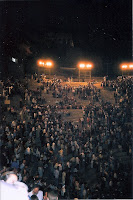
Our most bizarre subtitle experience had to be watching "Rigoletto" at the open-air Herod Atticus theater in Athens. The opera was sung in Italian and had subtitles in Greek, the words running along a rail which separated the orchestra from the audience. Of course, with opera, you can pretty much tell what is happening without the captions.
This is not the case with the BBC mysteries Nicodemus and I watch on television. There will be long monologues which are completely incomprehensible to me. N provides a running commentary, interpreting West Country and Scottish accents and Brit slang. Lately, on some shows, the BBC furnishes its own subtitles for rapid dialogue.
Sometimes we will watch a movie just to be together without conversation, the way some people play cards, and the last two films we saw have required a different kind of commentary.
"No Country for Old Men" and "The Dark Knight" are probably the most violent movies I have almost seen.
During the first of these, N had read the book, so he was able to explain the story to a mystified and somewhat repulsed me. During the second, an endless saga of murder and mayhem, I had to excuse myself many times for urgent errands. N would fill me in on who or what had been destroyed while I was brushing my teeth, feeding the cat, looking at tomorrow's calendar. At the end of the film, I was exhausted.
"I'm sorry," Nicodemus said.
(Photo: Opera-goers at Herod Atticus, with the darkened Parthenon in the background.)

1 comment:
Perhaps No Country appeals more to men. Patrick liked it (both book and movie) and read me parts and we watched the movie together. Javier Bardin (sp?) is truly frightening. Something about his hair makes me afraid to laugh, rather like when you suspect someone is more than a little crazy. Over the years violence in books and movies has become more like an actual assault. No country left me feeling bruised.
Post a Comment